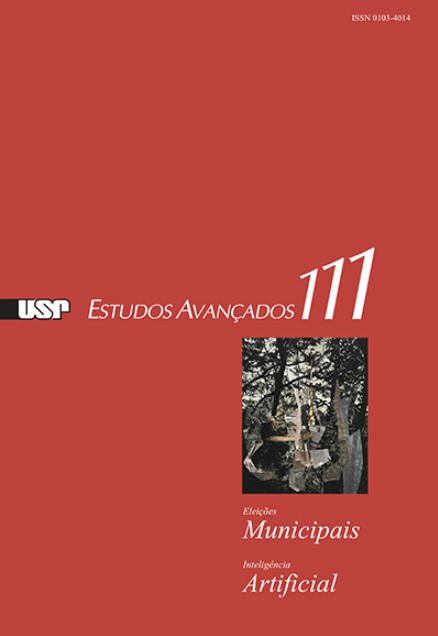Estatísticas Públicas, Big Data e Inteligência Artificial: o caso da Plataforma Global da ONU
DOI:
https://doi.org/10.1590/s0103-4014.202438111.018Palavras-chave:
Estatísticas públicas, Estatísticas oficiais, Big Data, Inteligência artificial, Plataforma Global das Nações UnidasResumo
Como ferramenta de prova e ferramenta de governo, a Estatística desempenhou papéis fundamentais no desenvolvimento da ciência, nos modos de ação do Estado, e em vários ramos da economia. O desenvolvimento das tecnologias digitais no século XXI conduziu a uma produção crescente de dados e ao surgimento de um novo campo algorítmico de conhecimento e ação. Por meio de pesquisa empírica fundamentada em contribuições teóricas da sociologia da quantificação e dos Estudos de Ciência e Tecnologia, este artigo analisa algumas transformações nas estatísticas públicas produzidas pelos Institutos Nacionais de Estatística. Isso se baseia em uma investigação da recente promoção de Big Data e Inteligência Artificial para estatísticas oficiais no contexto das Nações Unidas.
Downloads
Referências
COULDRY, N.; MEJIAS UA The Costs of Connection. Standford: Standford Univ. Press, 2019.
DESROSIÈRES, A. The Politics of Large Numbers: a history of statistical reasoning. Cambridge: Harvard Univ. Press, 1998.
DESROSIÈRES, A. Pour une sociologie historique de la quantificação: L’argument statistique I. Paris: Presses de l’Ecole des mines, 2008.
DESROSIÈRES, A. Prouver et gouverner: Une analyse polítique des statistiques publiques. Paris: La Découverte, 2014.
DYER-WITHEFORD, N.; KJOSEN, AM; STEINHOFF, J. Inhuman Power: Artificial Intelligence and the Future of Capitalism. London: Pluto Press, 2019.
GABAY, C.; ILCAN, S. The Affective Politics of the Sustainable Development Goals: Partnership, Capacity-Building, and Big Data. Globalizations, v.14, n.3, p.468-85, 2017.
GPSDD. GPSDD: Data For Now Concept Note, 2019. Disponível em: <https://www.data4sdgs.org/index.php/initiatives/data-now>. Acesso em: 10 out. 2021.
GPSDD. GPSDD: Five-Years Strategy, 2020a. Disponível em: <https://www.data4sdgs.org/news/our-five-year-strategy-2019-2023>. Acesso em: 10 out. 2021.
GPSDD. GPSDD: Theory of Change, 2020b. Disponível em: <https://www.data4sdgs.org/resources/global-partnership-sustainable-development-datas-theory-change>. Acesso em: 10 out. 2021.
GPSDD. GPSDD: Five Years Report, 2020c. Disponível em: <https://www.data4sdgs.org/sites/default/files/file_uploads/GPSDD_5YearReport_8.5x11_v9_WebReady.pdf>. Acesso em: 10 out. 2021.
HARVEY, D. Condição Pós-Moderna: uma pesquisa sobre as origens da mudança cultural. São Paulo: Ed. Loyola, 2008.
ISIN, E.; RUPPERT, E. Data’s Empire: postcolonial data politics. In: Data Politics: Worlds, Subjects, Rights. New York: Routledge, 2019.
KOEHLER, G. The 2030 Agenda and eradicating poverty: New horizons for global social policy. Global Social Policy, v.17, n.2, p.210-16, 2017.
LATOUR, B. Ciência em ação: como seguir cientistas e engenheiros sociedade afora. São Paulo: Editora Unesp, 2011.
MACFELLY, S. The Big (data) Bang: Opportunities and Challenges for Compiling SDG Indicators. Global Policy, v.10, n.1, jan. 2019.
OECD-Paris 21. A Road map for a country-led Data Revolution. OECD-Paris 21, 2015.
ONU. Fundamental Principles of Official Statistics, 2014. Disponível em: <https://undocs.org/A/RES/68/261>. Acesso em: 13 jun. 2021.
ONU. Transforming our world: the 2030 Agenda for Sustainable Development, 2015. Disponível em:<https://www.un.org/en/development/desa/population/migration/generalassembly/docs/globalcompact/A_RES_70_1_E.pdf>. Acesso em: 10 maio 2021.
PASQUINELLI, M.; VLADAN, J. The Nooscope Manifested: Artificial Intelligence as Instrument of Knowledge Extrativism. KIM and Share Lab, 2020. Disponível em: <https://nooscope.ai/>. Acesso em: 13 out. 2021.
RIKAP, C. Capitalism, Power and Inovation: Intelectual Monopoly Capitalism Uncovered. New York: Routledge, 2021.
ROBIN, N.; KLEIN, T.; JÜTTING, J. Public-Private Partnerships for Statistics: Lessons Learned, Future Steps. OECD Working Paper 27 - Paris 21, 2016.
SHEYVENS, R.; BANKS, G.; HUGHES, E. The Private Sector and the SDGs: The Need to Move Beyond ‘Business as Usual’. Sustainable Development, v.24, p.371-82, 2016.
THATCHER, J.; O’SULLIVAN, D.; MAHMOUDI, D. Data colonialism through accumulation by dispossession: New metaphors for daily data. Environment and Planning D: Society and Space, v. 34, n.6, p. 990–1006, 2016.
UN-HLP. A New Global Partnership: Eradicate Poverty and Transform Economies Through Sustainable Development. New York: UN Publications, 2013.
UN-IEAG. A World that counts: Mobilising The Data Revolution for Sustainable Development, 2014. Disponível em:<https://www.undatarevolution.org/wp-content/uploads/2014/12/A-World-That-Counts2.pdf.> Acesso em: 7 set. 2021.
UN-STATCOM. Report of the High-level Group for Partnership, Coordination and Capacity-Building for Statistics for the 2030 Agenda. StatCom, S.48, Mar.2017, I.3(a), 2016. Disponível em: <https://digitallibrary.un.org/record/856029?ln=es>. Acesso em: 8 out. 2021.
UN-STATCOM. Terms of reference of the Global Working Group on Big Data for Official Statistics, 2015. Disponível em:<https://unstats.un.org/bigdata/documents/TOR%20--%20GWG%20-%202015.pdf>. Acesso em: 14 out. 2021.
UN-STATCOM. Cape Town Global Action Plan, 2017. Disponível em: <https://unstats.un.org/sdgs/hlg/cape-town-global-action-plan/>. Acesso em: 12 out. 2021.
UN-STATCOM. Report of the Global Working Group on Big Data for Official Statistics, 2019(a). Disponível em:<https://unstats.un.org/unsd/statcom/51st-session/documents/2020-24-BigData-E.pdf>. Acesso em: 13 out. 2021.
UN-STATCOM. UN Global Platform Business Model Options, 2019(b). Disponível em:<https://unstats.un.org/bigdata/about/documents.cshtml>. Acesso em: 17 out. 2021.
UN-STATCOM. Review of Implementation of Data Revolution, 2020(a). Disponível em: <https://unstats.un.org/unsd/statcom/51st-session/documents/BG-Item3a_Review--of-Implementation-of-Data-Revolution-E.pdf>. Acesso em: 20 out. 2021.
UN-STATCOM. Report of the Global Working Group on Big Data for Official Statistics, 2020(b). Disponível em:<https://unstats.un.org/unsd/statcom/52nd-session/documents/2021-14-BigData-E.pdf>. Acesso em: 22 out. 2021.
UN-STATCOM. UN Global Platform: Overview. GWG Annual meeting, 2020(c). Disponível em:<https://unstats.un.org/bigdata/events/2020/gwg-annual-meeting/>. Acesso em: 22 set. 2021.
UN-STATCOM. UN GWG Task Team on Big Data for SDGs, 2020(d). Disponível em: <https://unstats.un.org/bigdata/events/2020/gwg-annual-meeting/>. Acesso em: 15 set. 2021.
UN-STATCOM. Report of the Friends of the Chair group on economic statistics, 2020(e). Disponível em:<https://undocs.org/en/E/CN.3/2021/7>. Acesso em: 15 set. 2021.
WEBER, H. Politics of ‘Leaving No One Behind’: Contesting the 2030 Sustainable Development Goals Agenda. Globalizations, v.14, n.3, p.399-414, 2017.
ZUBOFF, S. The Age of Surveillance Capitalism. New York: Public Affairs, 2019.
Downloads
Publicado
Edição
Seção
Licença
Direitos autorais (c) 2024 Oscar Arruda d’Alva, Edemilson Paraná

Este trabalho está licenciado sob uma licença Creative Commons Attribution-NonCommercial 4.0 International License.
Estudos Avançados não celebra contrato de cessão de direitos autorais com seus colaboradores, razão pela qual não detém os direitos autorais dos artigos publicados. Os interessados em reproduzir artigos publicados na revista devem necessariamente obter o consentimento do autor e atribuir devidamente os créditos ao periódico.


